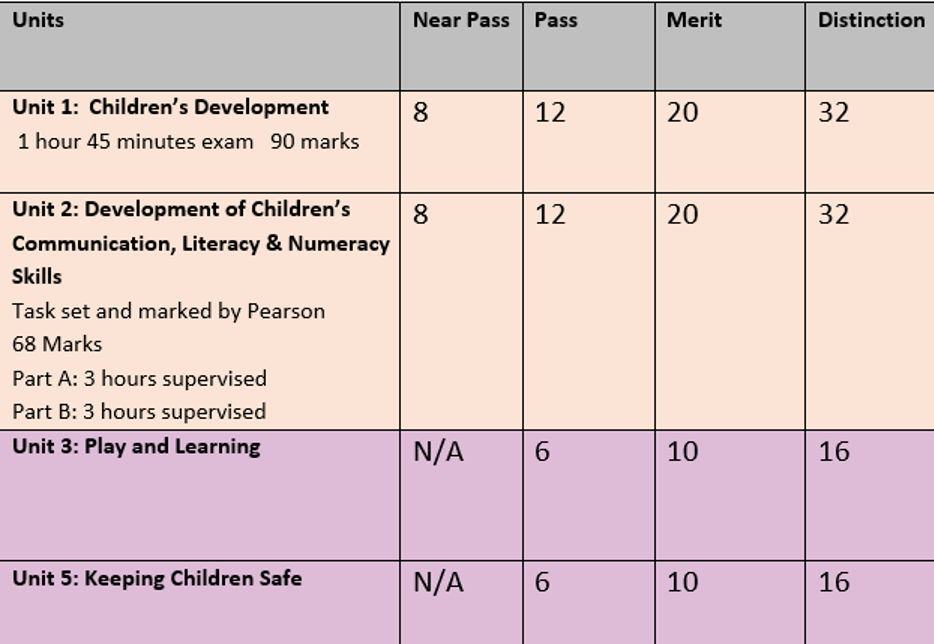
The core purpose of Child Development & CPLD at KEVI HWGA is to:
Child Development is a vocational option subject which is the equivalent of one GCSE. Students choose this option if they have an interest in working with children and are interested in all areas of child development.
Students have the opportunity to the opportunity to develop applied knowledge and understanding of child development and growth up to the age of five, how children learn through play and how meeting the needs of individual children will support their development, play and learning. In a practical learning environment, learners will have the opportunity to develop knowledge and technical skills in the following areas:
• the characteristics of children’s development from birth up to five years
• factors that affect growth and development
• the importance of play
• how play promotes children’s learning and development
• reasons why children may need support
• child-friendly environments to support play, learning and development in children from birth to five years old
• supporting all children to learn and develop physically, intellectually, emotionally and socially, and adapting activities to support children’s play, learning and development.
The knowledge acquired will support students in further study at Level 3/A Level in the subject areas of Childcare & Education; Health & Social Care; Psychology and Sociology.
Pearson BTEC Level 1/2 Technical Award in Child Development
Students work at Level 2 which is GCSE equivalent. They start this in Year 10, and will achieve the following qualification at the end of Year 11:
Component 1: Children’s Growth and Development – This will be assessed internally by two pieces of coursework
Component 2: Promoting Children’s Development through Play – – This will be assessed internally by two pieces of coursework
Component 3: Supporting Children to Play, Learn and Develop – This will be assessed by an externally assessed exam in Year 11
Pearson/Edexcel
Students will achieve a Pass, Merit or Distinction Grade for each Unit. To gain a Pass, they must achieve all the pass criteria in that unit; To gain a Merit, they must achieve all the Pass criteria and all the Merit criteria in that unit; To gain a Distinction, they must achieve all the Pass, Merit and Distinction criteria in that unit.
The grade they achieve in each unit, earns a set number of points (see below).

When these points are added together it will give students an overall grade of Level 1 Pass; Level 1 Merit; Level 1 Distinction; Level 2 Pass; Level 2 Merit; Level 2 Distinction; or Level 2 Distinction*

Component 1 contributes to 30% of the overall grade; Component 2 contributes to 30% of the overall grade; Component 3 contributes to 40% of the overall grade.
To be awarded a qualification, a learner must complete and achieve all three components with a grade Level 1 Pass or above, and achieve the minimum number of points at a grade threshold.
Pearson BTEC Level 3 National Extended Certificate in Children’s Play, Learning & Development
Students will work at Level 3, completing the equivalent of a 1 A Level qualification, when taken alongside other A level subjects or BTEC qualifications as part of a programme of study. This is a 2 year course.
This qualification is intended to offer a broad basis of study of the early years sector. This qualification is designed to support progression to higher education when taken as part of a programme of study that includes other appropriate BTEC Nationals or A Levels
Students will gain an understanding of children’s developmental progress from birth up to seven years 11 months. They will study the responsibilities of a professional to promote and maintain health and safety, and what to do in an emergency or when there are concerns about a child’s welfare.
Students will also gain an understanding of how children develop literacy, language, numeracy and communication skills and how to promote and support this development. They will study the benefits of play, the influence of theories and approaches to play, and how to provide and support purposeful play and learning activities for children.
Units covered in the first year of the course (Year 12)
Unit 1: Children’s Development– This will be assessed through an externally assessed examination which students complete in January.
Unit 5: Keeping Children Safe – This will be assessed through completion of 3 pieces of coursework, and involving completion of some tasks undertaken in work experience.
Units covered in the second year of the course (Year 13)
Unit 2: Development of Children’s Communication, Literacy and Numeracy Skills – This will be assessed through an externally assessed examination which students complete in January.
Unit 3: Play and Learning – This will be assessed through completion of coursework.
Work Experience:
In addition to timetabled lessons, students need to complete a minimum of 50 hours in at least one setting with children from birth to seven years, 11 months. This will be completed in the timetabled 2 week block of work experience in the summer term of Year 12.
Exam Board
Pearson/Edexcel
Grading:
Students will achieve a Pass, Merit or Distinction Grade for each Unit. To gain a Pass, they must achieve all the pass criteria in that unit; To gain a Merit, they must achieve all the Pass criteria and all the Merit criteria in that unit; To gain a Distinction, they must achieve all the Pass, Merit and Distinction criteria in that unit.
The grade they achieve in each unit, earns a set number of points (see below).

When these points are added together it will give students an overall grade of Pass; Merit; Distinction; or Distinction*

In Key Stage 5, students will undertake work experience in childcare settings, and will be assessed through observation in the workplace, and through completion of a portfolio which shows how they have demonstrated their competency.